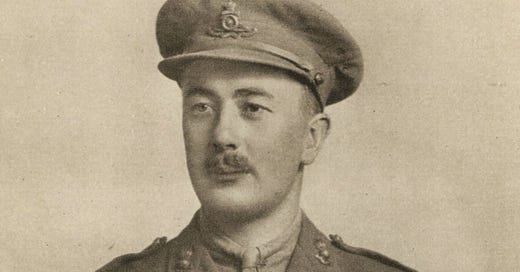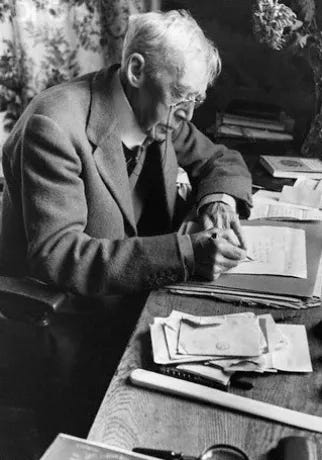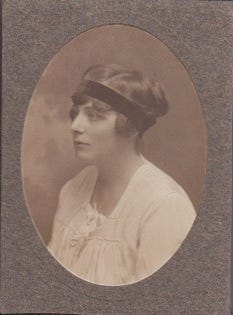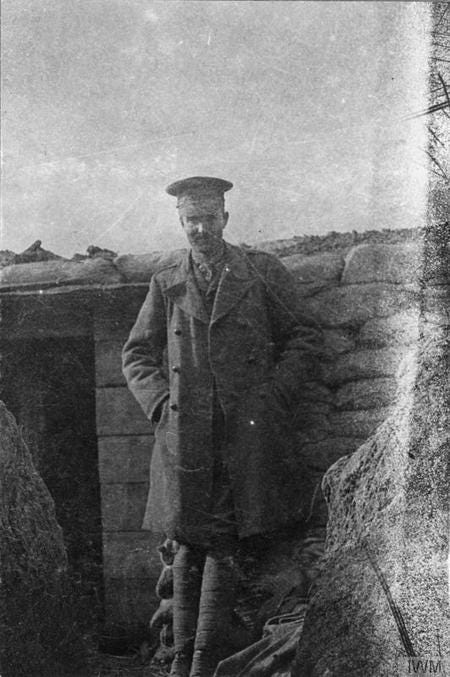I may have mentioned this before in a post, but when I was around 18 years old, I discovered The First World War. A family friend had put together an amazing exhibit on the soldier-poets in the local university’s special collection room. It isn’t an exaggeration to say that it was life-changing to discover these poets, to read quotes from their poems and letters and look at their young faces up on posters throughout the exhibit space.
I became a little obsessed with these soldier-poets. Isaac Rosenberg, Charles Sorley, Edmund Blunden, and of course, Siegfried Sassoon and Wilfred Owen.
Once you read a little about “The Great War”, you begin to be aware of the horrible ironies that took place during that conflict. Wilfred Owen’s death is an example of this: as his family celebrated the Armistice on November 11th, 1918, they recieve word that Wilfred was killed just one week before.
A lesser-known occurance is that of May Wedderburn Cannan and her fiance Bevil Quiller-Couch. The war had ended, and all was “safe” when she got word that Bevil, still in France, had contracted the Spanish Flu. He died February 6th, 1919. May could not go to him, as she wished to, and reading her account of these times is heartbreaking.
Bevil Quiller-Couch was the son of the novelist Arthur Quiller-Couch, who was known as “Q”. He is known for ‘The Oxford Book of English Verse’ which he put together, and as well as writing novels, he wrote ‘On the Art of Writing’ which is still well-regarded.
His novels are good. There is a gentleness to many of them (I’ve read a handful of them). I think my favorite is “The Westcotes” which is a thoughtful, but lighthearted story of the Regency Era (which would make a delighful BBC adaptation for Jane Austen era enthusiasts) involving an older single woman from a good Cornish family, and a French prisoner-of-war.
“Q” was a native of Cornwall. His daughter Foy (named after Fowey, the town in Cornwall) was a friend of Daphne Du Maurier. Another friend of the family was the Cannan family. Charles Cannan was the Dean of Trinity College in Oxford, and ran the Oxford University Press. His wife was Scottish, and they had three daughters. When still girls, they published an anthology of poetry (with an introduction by Quiller-Couch). Joanna, the youngest, would go on to become a novelist (I recommend her novel “Princes in the Land”). May, the middle daughter, fell in love with Bevil Quiller-Couch.
Before the War, she joined the Volunteer Aid Detatchment (which the better known Vera Brittain — who lost her brother and fiance in the war — did as well). She served as a nurse in Rouen in France in 1915, returned to England, then back to France, where she was able to see Bevil in 1918.
After the War, she was offered a job working for The Oxford Magazine. Of this time she writes:
What one needs most in shock and grief, is time. Losing one’s world, one still wanders in it, a ghost. It is for long, more real than the new world into which one knows (but does not want to know) one must presently move and live. ~ Grey Ghosts & Voices (1976)
May, also a writer, published her third book of poetry at this time. She published another book of poetry in 1923. A young man wrote her a letter after reading it, and suggested they meet. This ended up being Percival James Slater, who had also fought in the war. They married in 1924 as well, and she describes him in her memoir, “He was tall and had brown eyes. He wore loose brown tweeds and had a bull-nosed Morris two-seater and was nice to my dog.”
After one novel, ‘The Lonely Generation’ published in 1934, she didn’t publish any other work. Her husband, who also served in WWII, died in 1967. Her memoir, ‘Grey Ghosts and Voices’ which was published in 1976, three years after her death.
She remained friends with “Q” and writes of a charming encounter she had with him after the war at the Athenaeum Club in London:
And on his way back to Fowey from Cambridge came “Q”. He was never a Member, having he said no use for a place where he could not take his wife, and sending up a message waited for me in the hall. He had come to ask me to dine with him and see him into his train for Fowey. On parting he said “I suppose I can have a kiss even in the Athenaeum? to which I replied “anywhere in the world”, and kissed him.
As he went and I turned to go back to work I saw Charles Graves. I hurried and walked with him up the great stairs. “That” I said in a small voice, “was “Q’.” “So I saw”. “If it had not been for the War” I said rather desperately, he would have been my father-in-law”. He stopped, looked at me very kindly and said “And the bond holds , and went on his way. And I did not get thrown out for kissing in that august place! ~ Grey Ghosts & Voices
It was, I think, this passage which gave me an idea for a novel — to have two close families, as the Cannan’s and the Quiller-Couch’s were, and have a girl engaged to the son who dies. From there on my novel departed, but I wrote it (several years ago — my first draft was written in the early 2000s, around the time I moved to NY). It began in first person, from the girl’s point-of-view, and was set in England. However, over the years, the story has changed, and when I was at school in Glasgow, I changed the setting to Scotland.
Characters have come and gone, names have changed, but the core inspiration is still May Wedderburn Cannan, her engagement to Bevil and her friendship with “Q”. I’ve been contemplating sharing this novel, in serialized form here on Substack, so it’s been on my mind, and I wanted to revisit these old friends. Brushing up on their lives and sorrows, I am again impressed by the experiences they went through and how they tried to pick up their lives after the devastating effects of The Great War.








Very interesting! I love the common humanism you find in odd stories.
Always nice to revisit these old friends! I’m excited that you may share your novel!